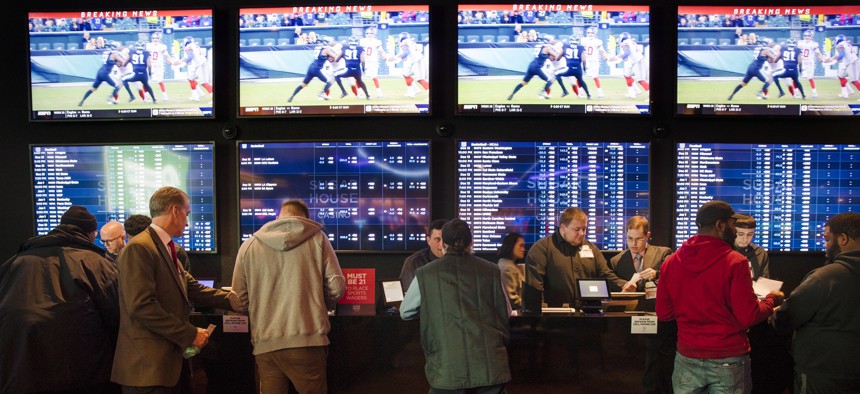Few Signs So Far Sports Wagering Will Be Huge Boon for State Budgets

In this Thursday, Dec. 13, 2018, file photo, gamblers place bets in the temporary sports betting area at the SugarHouse Casino in Philadelphia. AP Photo/Matt Rourke, File
“Large amounts of tax revenue from sports gambling is no sure bet,” one expert notes.
Six states have joined Nevada in allowing for sports betting since the U.S. Supreme Court in May struck down a federal law that had largely blocked the practice.
Delaware, Mississippi, New Jersey, Pennsylvania, Rhode Island and West Virginia have entered the sports betting field so far. The District of Columbia is also moving ahead with a sports betting program and during upcoming legislative sessions state lawmakers elsewhere are expected to discuss the topic.
But a researcher with the Urban-Brookings Tax Policy Center, Richard Auxier, cautioned this week that the wagering may not generate as much tax revenue as some are hoping for.
“Raising large amounts of tax revenue from sports gambling is no sure bet,” he wrote in an online post.
Auxier points out that Nevada collected about $20 million over the past 12 months—about 0.1 percent of annual general revenue in the state.
New Jersey brought in around $8 million (including $5 million from online wagers) in sports betting tax revenue during the first six months of its program. That number equals about 0.02 percent of the $34.4 billion in general revenues the state reported in fiscal 2017.
Neighboring Pennsylvania posted an initial report on sports wagering there on Dec. 18 that showed about two weeks of returns in November for betting at the Hollywood Casino at Penn National Race Course, the first place to launch sports wagering in the state.
The report says the “handle” at the casino, a term that refers to the total amount bet, was about $1.4 million, with revenues of around $508,000 after payouts. The 36 percent tax rate in the state on adjusted gross revenue yielded $183,238.
Rivers Casino in Pittsburgh and SugarHouse Casino in Philadelphia began to offer sports betting in December. Revenue figures for those places will be available in this month’s report.
Auxier highlights a range of topics policymakers may want to think about if they’re weighing whether to legalize sports betting in their state. One big issue has to do with setting tax rates at a level that maximizes revenues without dis-incentivizing wagering.
Tax rates in the seven states that now allow for sports gambling range from 6.75 percent in Nevada to 51 percent in Rhode Island.
Moody’s Investors Service, in a report last year, cited estimates commissioned by the American Gaming Association that showed all 50 states could collect a combined $1.5 billion each year in taxes if they made sports gambling widely available with an 8 percent tax rate.
“At less than 0.2% of total fiscal year 2017 operating funds for the 50 states, sports betting would be a negligible budget win for states,” the Moody’s report added.
The Tax Policy Center post touches on a range of other topics like “integrity fees” sports leagues command in states that allow sports betting, and considerations with internet wagering, as some states that have legal sports betting still don’t allow people to do it online.
Other experts have warned previously that sports gambling revenues could be tepid relative to the size of state budgets.
Bill Lucia is a Senior Reporter for Route Fifty and is based in Washington, D.C.
NEXT STORY: A Prolonged Shutdown Will Hit Counties With Tight Cash Flows Hardest






